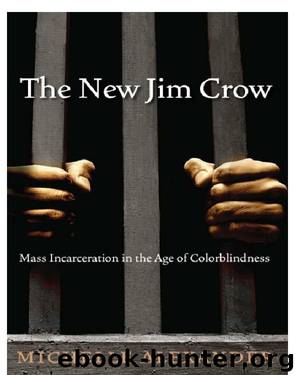The New Jim Crow by Michelle Alexander

Author:Michelle Alexander
Language: eng
Format: mobi, epub
Publisher: New Press, The
Published: 2010-11-05T05:00:00+00:00
Boxed In
Aside from figuring out where to sleep, nothing is more worrisome for people leaving prison than figuring out where to work. In fact, a study by the Vera Institute found that during the first month after release from prison, people consistently were more preoccupied with finding work than anything else.17 Some of the pressure to find work comes directly from the criminal justice system. According to one survey of state parole agencies, forty of the fifty-one jurisdictions surveyed (the fifty states and the District of Columbia) required parolees to “maintain gainful employment.”18 Failure to do so could mean more prison time.
Even beyond the need to comply with the conditions of parole, employment satisfies a more basic human need—the fundamental need to be self sufficient, to contribute, to support one’s family, and to add value to society at large. Finding a job allows a person to establish a positive role in the community, develop a healthy self-image, and keep a distance from negative influences and opportunities for illegal behavior. Work is deemed so fundamental to human existence in many countries around the world that it is regarded as a basic human right. Deprivation of work, particularly among men, is strongly associated with depression and violence.
Landing a job after release from prison is no small feat. “I’ve watched the discrimination and experienced it firsthand when you have to check the box,” says Susan Burton, an ex-offender who founded a business aimed at providing formerly incarcerated women the support necessary to re-establish themselves in the workforce. The “box” she refers to is the question on job applications in which applicants are asked to check “yes” or “no” if they have ever been convicted of a crime. “It’s not only [on] job [applications],” Burton explains. “It’s on housing. It’s on a school application. It’s on welfare applications. It’s everywhere you turn.”19
Nearly every state allows private employers to discriminate on the basis of past criminal convictions. In fact, employers in most states can deny jobs to people who were arrested but never convicted of any crime. Only ten states prohibit all employers and licensing agencies from considering arrests, and three states prohibit some employers and occupational and licensing agencies from doing so.20 Employers in a growing number of professions are barred by state licensing agencies from hiring people with a wide range of criminal convictions, even convictions unrelated to the job or license sought.21
The result of these discriminatory laws is that virtually every job application, whether for dog catcher, bus driver, Burger King cashier, or accountant, asks ex-offenders to “check the box.” Most ex-offenders have difficulty even getting an interview after they have checked the box, because most employers are unwilling to consider hiring a self-identified criminal. One survey showed that although 90 percent of employers say they are willing to consider filling their most recent job vacancy with a welfare recipient, only 40 percent are willing to consider doing so with an ex-offender.22 Similarly, a 2002 survey of 122 California employers revealed that
Download
This site does not store any files on its server. We only index and link to content provided by other sites. Please contact the content providers to delete copyright contents if any and email us, we'll remove relevant links or contents immediately.
| African-American Studies | Asian American Studies |
| Disabled | Ethnic Studies |
| Hispanic American Studies | LGBT |
| Minority Studies | Native American Studies |
Cecilia; Or, Memoirs of an Heiress — Volume 1 by Fanny Burney(31332)
Cecilia; Or, Memoirs of an Heiress — Volume 3 by Fanny Burney(30934)
Cecilia; Or, Memoirs of an Heiress — Volume 2 by Fanny Burney(30889)
The Great Music City by Andrea Baker(21283)
We're Going to Need More Wine by Gabrielle Union(18072)
Bombshells: Glamour Girls of a Lifetime by Sullivan Steve(13108)
Pimp by Iceberg Slim(12931)
All the Missing Girls by Megan Miranda(12747)
Fifty Shades Freed by E L James(12451)
Norse Mythology by Gaiman Neil(11883)
Talking to Strangers by Malcolm Gladwell(11876)
Crazy Rich Asians by Kevin Kwan(8349)
Mindhunter: Inside the FBI's Elite Serial Crime Unit by John E. Douglas & Mark Olshaker(7834)
The Lost Art of Listening by Michael P. Nichols(6472)
Enlightenment Now: The Case for Reason, Science, Humanism, and Progress by Steven Pinker(6405)
Bad Blood by John Carreyrou(5768)
The Four Agreements by Don Miguel Ruiz(5510)
Weapons of Math Destruction by Cathy O'Neil(5036)
We Need to Talk by Celeste Headlee(4868)
